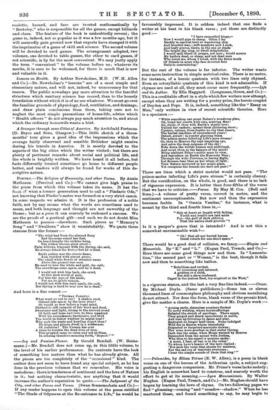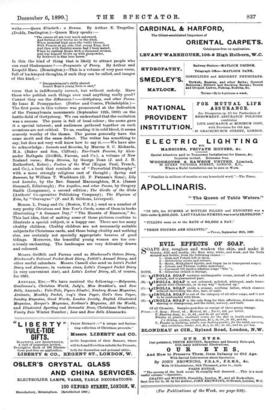POETRY. —The Religion of Humanity, and other Poems. By Annie Matheson.
(Percival and Co.)—We cannot give high praise to the poem from which this volume takes its name. It has the form of what a former generation used to call a " Pindaric Ode," not knowing that Pindar's metre was formed on a very strict canon. In some respects we admire it. It is the profession of a noble faith, not by any means what the words are sometimes used to mean, and both language and thought are not unworthy of the theme ; but as a poem it can scarcely be reckoned a success. We see the proofs of a poetical gift—and such we do not doubt Miss Matheson to possess—elsewhere. Such pieces as " Memory's Song " and " Swallows " show it unmistakably. We quote three stanzas from the former :— "The wind had from the almond flung
Red blo,soms round her feet, On hazel•boughs the catkins hung,
The willow blooms grew sweet—
Palm willows, fragrant with the Spring, she said, He always found the first but he is dead.
Right golden was the croons flame, And, touched with purest green, The small white flower of stainless name Above the ground was seen.
He used to love the white and gold, she said; The snowdrops come again, and he is dead.
I would not wish him back, she cried, In this dark world of pain. For him the joys of life abide, For me its griefs remain.
I would not wish him back again, she said, But Spring is hard to bear now he is dead."
And here is a fine sonnet
THOMAS CARLYLE.
What went ye out to see ? A shaken reed, Ftirred into music by the lyric wind?
Or would ye bow before a regal mind, Clothed in soft raiment of fair word and deed, Sweetness and light, strong in the ancient creed Of faith and hope and love, to bless mankind With his consummate harmonies, and bind
The world to follow whither he might lead ?
Why seek the waste and howling desert then ? Do kings and priests dwell in a wilderness Of isolation? The Unseen has sent A voice to trouble the dead lives of men.
This prophet came to curse and not to bless, In echoing thunders moaning forth, ' Repent !'"
—Ivy and Passion-Flower. By Gerald Bendall. (W. Heine- mann.)—Mr. Bendall does not come up, in this little volume, to the level of his earlier performance. Its contents have the look of something less mature than what he has already given. All the pieces are too completely of the " occasional " kind. The author does not seem to have found any special subject, as he has done in the previous volumes that we remember. His voice is melodious ; there is tenderness of sentiment and the love of Nature' in it ; but nothing characteristic, nor anything that it would increase the author's reputation to quote.—The Judgment of the City, and other Poems and Verses. (Swan Sonnenschein and Co.)— If any reader happens to open this volume at the poem entitled "The Shade of Odysseus at the Re-entrance to Life," he would be
favourably impressed. It is seldom indeed that one finds a writer at his best in his blank verse ; yet these are distinctly good :—
"I have counselled kings,—
Now I would pipe to sheep. Often 1 lay Darkly in martial tent or wandering ship And brooded war,—soft meadows now I seek.
And leafy groves, there, in the sun or shade The bright day long. to dwell delightfully. I would spill blood of grapes, not men ; would mourn My heifers dead, or sheep, and not dead men Who loved me, whom I loved, with the fierce truth Of friends in arms who face severest fate Daily in comradeship."
But the rest of the volume is far inferior. The writer wants some more instruction in simple metrical rules. There is no metre, for instance, of a heroic quatrain with two lines only rhymed. Even an octosyllabic quatrain of this kind is not admissible. If rhymes are used at all, they must occur more frequently.—Life and its Author. By Ella Haggard. (Longmans, Green, and Co.)— This is a creditable effort in a style which few writers now attempt, except when they are writing for a poetry prize, the heroic couplet of Dryden and Pope. It is, indeed, something like the " Essay on Man," only written in view of recent scientific theories. Here is a specimen :— " While searching out great Nature's wondrous plan,
Oh, tread her courts with awe, aspiring Man! Go, study, if thou wilt, Earth's mystic lore; Unlock her caskets; spread their glittering store ; Upraise, relume, from depths no ray that cheers, The buried sunshine of unnumbered years !
Detect, arrest I in yonder glancing beam The poison-motes infecting Life's pure stream! Or, turn to Heaven thy rapt enquiring eye, And solve the deep enigmas of the sky Note down the worlds unseen and nndivined, And weigh them in the balance of thy mind! Bring ambient Ether's subtle mass to view, And reproduce on Earth the Heavenly Blue; Through the wide lJniverse, in daring flight, Let Science bear thee on her wings of light ; View Nature mirrored in her magic glass, Yet recognise the bounds she dare not pass ! "
These are lines which a strict metrist would not pass. "The poison-motes infecting Life's pure stream " is certainly clumsy. But the versification, on the whole, is good, and there is no lack of vigorous expression. It is better than four-fifths of the verse that we have to criticise.—Poems. By May M. Cox. (Bell and Sons.)—A volume of pretty verse, correct in metre, and the sentiment unexceptionable. But now and then the expression becomes feeble. In "Omnia Vanitas," for instance, what is meant by the third and fourth lines in,— "Sick at heart at length with failing,
Youth and health are laid aside For—the gulf of dark oblivion That the nation shall provide " ?
Is it a pauper's grave that is intended ? And is not this a somewhat unreasonable wish ?—
" Oh! that all our buried heroes Could return for one short space."
There would be a good deal of collision, we fancy.—Elegies and Memorials. By "E." and " L." (Keg= Paul, Trench, and Co.)— Here there are some good things now and then. In "Lamenta- tion," the second part or " Woman," is the best, though it falls now and then to something like bathos.
" Rebellious and reviled, Or crouching and caressed, A goddess or a child, But still a slave confessed.
Caged in the jealous East, toy-sceptred in the West,"
is a vigorous stanza, and the last a very fine line indeed.—Cause. By Michael Doyle. (Same publishers.)—Some ten or eleven thousand lines of commonplace philosophy and obvious moralising do not attract. Nor does the form, blank verse of the prosaic kind, give the matter a charm. Here is a sample of Mr. Doyle's work :—
"Arising early, shameless numbers flocked
To novel worship, where burnt-offerings Exhaled the stench of sacrilege. There squat, They gorged and drank immoderate in mirth, And rose up frivolous to dance and play. Restraint no longer held them. Some indulged Wild fits in figures whose immodesty Disgusted or surprised associate clowns ; Tho' none were prudent in that sinful throng. Such was the scene, when Moses warned by Heaven Descended from the mount with Joshua, Who thus to his superior anxious spoke ' A Noise, I fear, of war is in the camp.' To whom Love's bearer of the laws replied : 'Not such the voice that shouts for mastery, Nor the sad cry of warriors overcome ;
I hear the simple sounds of them that sing.'" —Palomides, by /Eli= Prime (E. W. Allen), is a poem in blank verse on one of the heroes of the Arthurian cycle, a subject sug- gesting a dangerous comparison. Mr. Prime's verse lacks melody ; his English is somewhat hard to construe, and scarcely worth the effort to get at its meaning.—Lyra Mancuniensis. By Walter Hughes. (Kogan Paul, Trench, and Co.)—Mr. Hughes should have begun by learning the laws of rhyme. On two following pages we find " gloaming—coming "and " meadow—shadow." When he has mastered these, and found something to say, he may begin to write.—Queen Elizabeth : a Drama. By Arthur E. Tregelles. (Dodds, Darlington.)—Queen Mary speaks : —
"The omens all are very much untoward, And fortune ever leaves me in the ditch. When mounted high upon the Gallic throne, With Francis at my side, thatyoung King, died. And then with Darnley scarce had I been mated, When he stabbed Rizzi') with a thousand strokes, And was himself blown up with gunpowder, By Bothwell in that lone house."
Is this the kind of thing that is likely to attract people who can read Shakespeare ?—Fragments of Fancy. By Arthur and Leopold Hare. (Remington.)—This is a volume of very poor verse, full of hackneyed thoughts, if such they can be called, and images of this kind,—
"Disappointment's chilly shroud Round Hope's young form is oast,"
verse that is indifferently correct, but without melody. Have those who publish such things ever read anything really good ? Cannot they see the difference P—Gettysburg, and other Poems. By Isaac R. Pennypacker. (Potter and Coates, Philadelphia.)— The first poem in this volume was pronounced at the dedication of the Pennsylvania monuments (September 12th, 1889) on the battle-field of Gettysburg. We can understand that the recitation was a success. The poem is full of local colour ; the scene gave it a special interest ; and audiences gathered together on such occasions are not critical. To us, reading it in cold blood, it seems scarcely worthy of the theme. The poems generally have the same merit and the same defect. The writer has something to say, but does not very well know how to say it.—We have also to acknowledge : Sonnets and Reveries, by Marcus S. C. Rickards, M.A. (Baker and Son, Clifton) ; Far-South Fancies, by Alex- ander Bathgate (Griffith, Farran, and Co.), a volume of New Zealand verse ; Harp Strains, by George Dean (J. and J. H. Rutherford, Kelso) ; Psalms of the West (Kagan Paul, Trench, and Co.), a book that reminds one of " Proverbial Philosophy" with a more strongly religious cast of thought ; Spring and Summer, by William T. Washburn (G. P. Putnam's Sons) ; Lay and Leander, by the Rev. Samuel Maenaughton, M.A. (James Gemmell, Edinburgh) ; Pra Angelico, and other Poems, by Gregory Smith (Longmans), a second edition ; The Girdle of the Globe (Authors' Co-operative Publishing Company) ; The Elysium of Erin, by " Ourvayne" (F. and E. Gibbons, Liverpool).























































 Previous page
Previous page